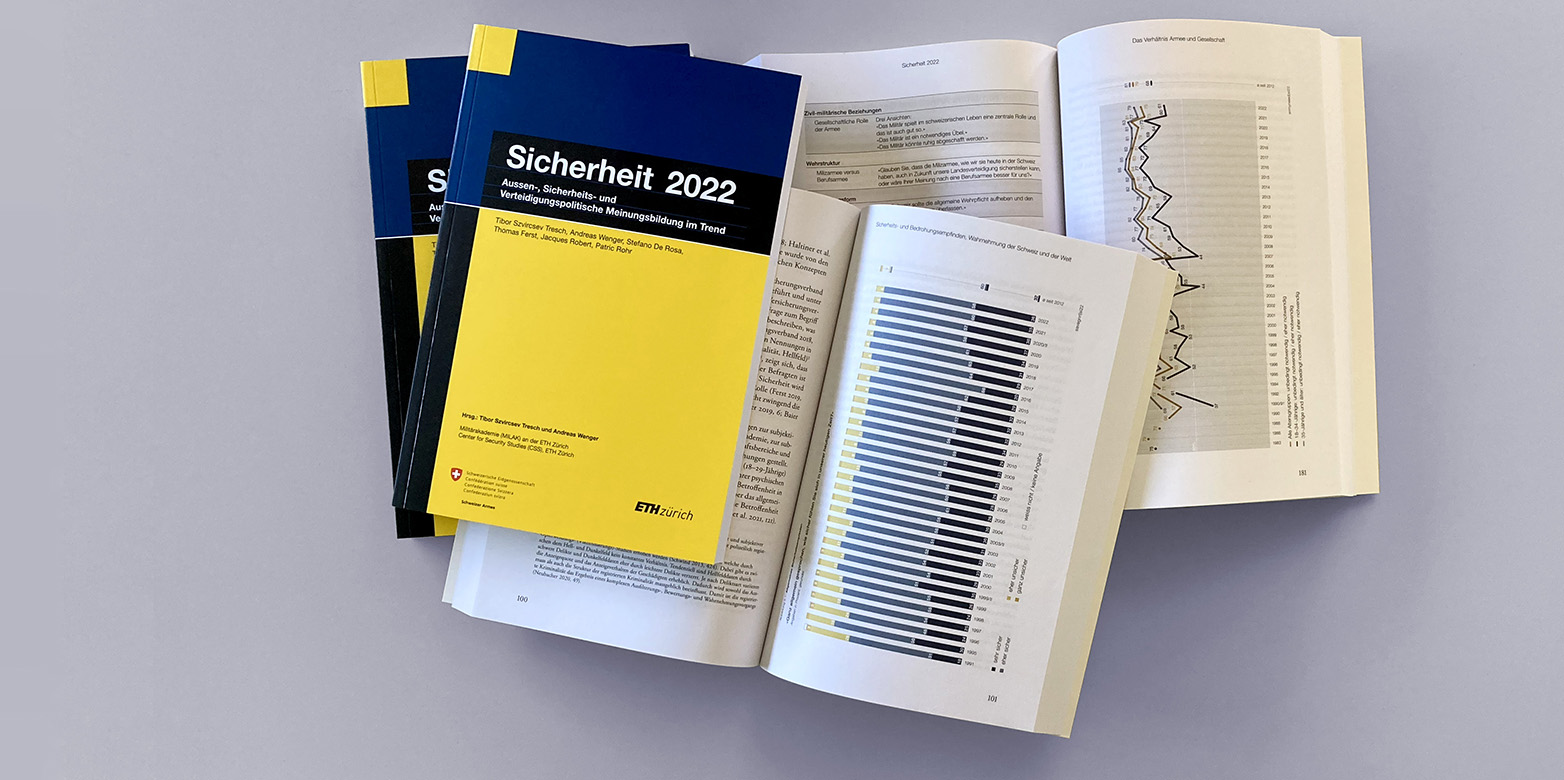Sicherheit 2022. Aussen-, Sicherheits- und Verteidigungspolitische Meinungsbildung im Trend
The Military Academy at ETH Zurich and the Center for Security Studies at ETH Zurich have published the survey «Sicherheit 2022». Since 1999, the annual study has evaluated long-term trends and tendencies in public opinion on foreign, security and defense policy issues in Switzerland. Due to the war in Ukraine, a follow-up survey was carried out this year, which will be published on July 14, 2022.

To the publication (in German)
The survey data for “Sicherheit 2022” were collected between 4 and 20 January 2022. The COVID-19-pandemic and related consequences, as well as tensions between the North Atlantic Treaty Organization (NATO) and Russia due to the Ukraine crisis, may have had an impact on response behavior. The sampling error of the survey is ±2.9 percentage points with 1217 eligible voters surveyed. Changes compared to the previous year, which are statistically significant and therefore important, are explicitly mentioned in the text.
Sense of Security and Perception of Switzerland and the World: At the beginning of 2022, the perception of security remains at a high level. Nine out of ten Swiss people generally feel secure. Compared with the previous year, optimism about the future of Switzerland has increased. In contrast, respondents assess the future development of the global political situation to be the same as in 2021.
Trust in Authorities and Institutions: Feeling of Policy Failure: There have been no changes in trust towards authorities and institutions compared with 2021. This confirms the high level of trust in all the institutions surveyed here. The Swiss trust the police and the scientific community the most. The courts and the Federal Council rank third and fourth. The Swiss economy, the Swiss Parliament and the armed forces rank in the middle. The political parties and the media achieve the lowest trust ratings. In line with the high level of trust in the authorities and institutions, the feeling that politics usually fails in crucial matters is also low.
Autonomy and Willingness to Open Up: Compared to the previous year, the willingness of the Swiss to open up remains unchanged and low. There is clear support for economic cooperation with the EU. There is greater support for joining the EU, but it is still clearly rejected overall. A majority of the population continues to support soft forms of cooperation without institutional ties, such as the use of Switzerland’s “good offices”, increased conflict mediation and intensified development aid. Although Switzerland’s commitment within the UN (seat on the UN Security Council, commitment to UN causes, Swiss UN peacekeeping forces) enjoys significantly less support, the majority continues to support the three forms of cooperation with the UN. One quarter of the Swiss population supports their country joining NATO. Support for the view that Switzerland should keep away from alliances and unions with other states has fallen and is called for by less than a third of respondents. Four out of ten respondents support military autonomy (relying only on one’s own national defense).
Neutrality: At the beginning of 2022, the Swiss still strongly and almost unanimously approve of neutrality. A slight majority approves of differential neutrality, and a clear majority still approves of its solidarity and identity functions. Agreement that neutrality can no longer be credibly protected has increased, but this view is upheld by only a minority. For the respondents, neutrality is and remains a value in itself, which, from the point of view of the voting population, clearly brings more advantages than disadvantages.
Freedom versus Security: In general, compared to 2018, the current tension between the fundamental social values of freedom and security lies in favor of security. The proportion of people who favor freedom over security has fallen. This view is now shared by only a minority. Agreement with the statement that the state must take on more and more tasks in today’s world has fallen compared with 2008 and is shared by 50% of respondents. Agreement that “in Switzerland we will soon be at the point where the state interferes everywhere, regulates everything and the freedom of the individual is being lost” has also fallen. While almost half of respondents agreed with this statement in 2007, one-third of the Swiss hold this view in 2022.
Attitudes towards the Swiss Armed Forces: A clear majority of the population in 2022 supports the necessity of the armed forces. Agreement that Switzerland should maintain a “very well-trained” and “fully equipped” armed forces has increased significantly, reaching a peak in each case. The electorate favors a militia armed forces over a professional armed forces. Satisfaction with the performance of the armed forces has increased and is above average. The abolition of compulsory military service is a concern shared by only a minority. Defense spending is considered “just right” by a relative majority at the beginning of 2022, and the military is rated as central to society.
Compulsory Orientation Day for Women: In 2022, an ambivalent attitude among Swiss men and women regarding a compulsory orientation day for women, which was already noted in 2018, is evident. Compared to 2018, the Swiss population is less supportive of a mandatory orientation day for Swiss women – but it still tends to be supported by a majority. At the same time, however, a majority would still like the orientation day for women to be voluntary.